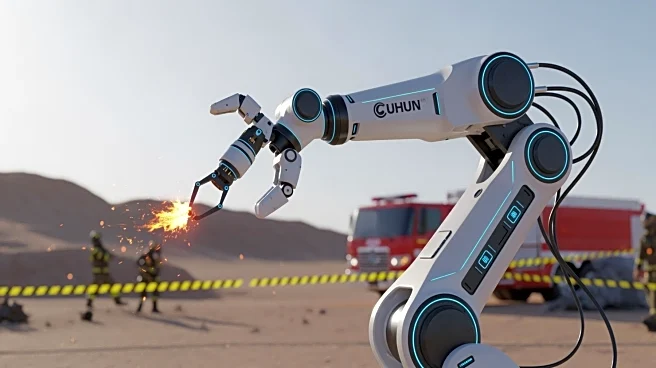What's Happening?
Lianhe Sowell International Group Ltd., a Nasdaq-listed company, has announced a significant financial agreement to establish its first AI-powered robot manufacturing and R&D base in the United Arab Emirates
(UAE). The company has signed a non-binding term sheet with Excellent Capital Investments, a European infrastructure investment fund, securing $105 million in structured senior secured credit support. This funding will cover 80% of the estimated $132.5 million project cost, with Lianhe Sowell contributing the remaining 20%. The initiative marks a strategic expansion of Lianhe Sowell's global intelligent manufacturing strategy, leveraging the UAE's geographic and business advantages to enhance its global industrial chain presence.
Why It's Important?
This development is significant as it underscores the growing role of the UAE as a hub for advanced manufacturing and AI technology. The project is expected to produce several thousand AI robots annually and create over 2,000 high-skill jobs, contributing to the UAE's 'Industry 4.0' strategy. It also highlights the increasing integration of global capital and technology resources, positioning Lianhe Sowell as a key player in the international AI manufacturing ecosystem. The move could potentially boost regional economic growth and innovation, while also promoting industrial automation and green manufacturing across the Middle East.
What's Next?
The construction of the manufacturing and R&D base is anticipated to take approximately 18 months. Upon completion, Lianhe Sowell plans to establish a robotics technology training and certification center to support local talent development. The company aims to further expand its presence in the Middle East and global markets, advancing collaboration in the automation industry chain. This initiative is expected to redefine the global industrial landscape, showcasing Chinese smart manufacturing on the international stage.
Beyond the Headlines
The establishment of this AI robot manufacturing base in the UAE could have broader implications for the global manufacturing industry. It represents a shift towards more integrated and collaborative international industrial strategies, potentially influencing other companies to adopt similar approaches. Additionally, the focus on AI and automation aligns with global trends towards increased efficiency and technological advancement in manufacturing processes.










